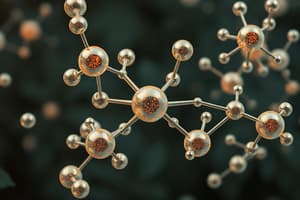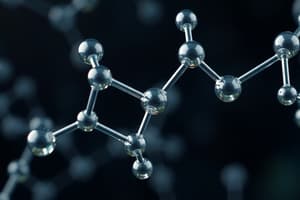Podcast
Questions and Answers
What is organic chemistry?
What is organic chemistry?
The study of compounds that contain bonds between carbon atoms.
What is the significance of carbon having 4 valence electrons?
What is the significance of carbon having 4 valence electrons?
It allows carbon to bond with many important elements, forming various possible compounds.
Which of the following are types of macromolecules?
Which of the following are types of macromolecules?
- Carbohydrates (correct)
- Proteins (correct)
- Lipids (correct)
- Nucleic Acids (correct)
What are carbohydrates primarily made up of?
What are carbohydrates primarily made up of?
What are the monomers of carbohydrates called?
What are the monomers of carbohydrates called?
The main function of carbohydrates is to provide ______ and support structures in plants.
The main function of carbohydrates is to provide ______ and support structures in plants.
What are lipids?
What are lipids?
Which of the following is NOT an example of a carbohydrate?
Which of the following is NOT an example of a carbohydrate?
Flashcards are hidden until you start studying
Study Notes
The Chemistry of Carbon
- Organic chemistry is the study of compounds containing carbon atoms
- Carbon has 4 valence electrons, allowing it to bond with many elements
- Carbon can form single, double, and triple bonds with other atoms.
- Carbon atoms can bond with other carbon atoms to form long chains, branched chains, and rings.
Macromolecules
- Large organic molecules essential for life are called macromolecules.
- Macromolecules are primarily composed of carbon, hydrogen, oxygen, and nitrogen.
Carbohydrates
- Carbohydrates are sugars and starches.
- Carbohydrates are used for short-term energy storage and structural support.
- Examples of carbohydrates include potatoes, bread, grains, pasta, sugars, fruits, and vegetables.
- Carbohydrates are composed of carbon, hydrogen, and oxygen.
- Monosaccharides (simple sugars) are the monomers of carbohydrates.
- Common monosaccharides are fructose, glucose, and galactose.
Lipids
- Lipids are greasy or oily substances that are not soluble in water (nonpolar).
- Lipids are used for long-term energy storage, insulation, and cell membrane structure.
- Examples of lipids include oils, butter, and nuts.
Studying That Suits You
Use AI to generate personalized quizzes and flashcards to suit your learning preferences.




